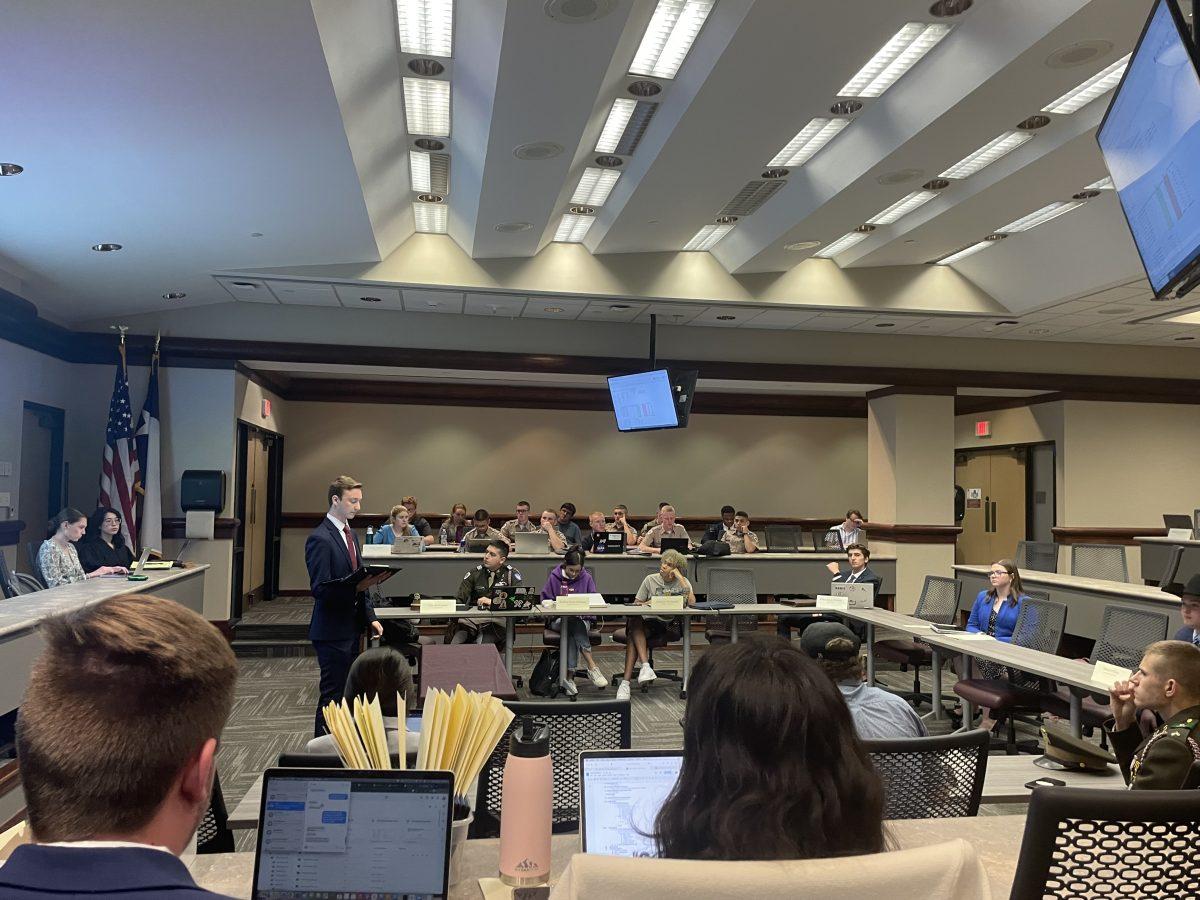Editor’s Note: This story has been updated as of March 10, 2023 to correct spelling errors and update information on S.A. 75-27.
After three back-to-back weekly meetings with heavy agendas lasting over two hours, this student senate meeting was short and sweet before spring break.
One action item on the agenda was the confirmation of a new member to fill the vacant spot in the University Rules Committee. Presenting the nominee, geosciences senator Joshua Benson was present.
“We need someone to fill the spot in the University Rules Committee for the next two meetings,” Benson said. “This nominee has been endorsed by Student Body President Case Harris and a member of his cabinet, [marketing junior] Cate Craddock.”
To replace the vacant spot, fish aide Owen Denman was nominated. The floor was then open to questions where he answered questions about his goals for the student body.
“My goal is to standardize the code of conduct and work with the registrar,” Denman said. “I also want to work with the registrar on students creating their own majors like how they do at NYU and other universities.”
After the questioning and debate period elapsed, the confirmation of this nominee was put to a verbal vote. Denman was confirmed as a member of the University Rules Committee with the promise to serve the student body’s best interests.
The senate shifted to its new business with two acts.
The first act presented was S.A. 75-27, Two First Reappointment Act. The bill was introduced by geosciences senator Joshua Benson, who read out the act for the senators.
“The members of the student senate shall be divided into two equally sized main groups: academic and residency seats,” Benson said. “Two is the minimum number of seats allocated to a caucus.”
The remaining seats in the academic and residency groups shall be divided based on the percentage of students to the total in the group. This does exclude the freshman caucus, which is fixed at two seats.
The proposed changes to the student senate seats are as follows:
-
Instead of three seats, the College of Agriculture and Life Sciences will be allocated five seats.
-
Instead of two seats, the School of Architecture will be allocated three seats to account for additional students in the Department of Visualization and the School of Visual and Performing Arts.
-
Instead of two seats, the Mays School of Business will be allocated four seats.
-
Instead of two seats, the School of Education will be allocated four seats to the additional students in the Department of Technology Management and Division of Health Education.
-
Instead of 12 seats, the College of Engineering will be allocated nine seats.
-
Instead of two seats, the Health Science Center will be allocated four seats.
-
Instead of 10 seats, the College of Arts & Sciences will be allocated eight seats.
-
Instead of two seats, the Bush School of Government & Public Service will be allocated three seats.
The proposed changes for residency representatives include:
-
Instead of six seats, the On-Campus caucus will be allocated seven seats.
-
Instead of 32 seats, the Off-Campus caucus will be allocated 28 seats.
-
Instead of two seats, the Corps of Cadets caucus will be allocated three seats.
-
The freshman caucus will be allocated two seats for representatives with a freshman classification in their first semester, unless filling a spring vacancy.
Benson said this act is important as the senate had three vacant seats this election that no one even ran for.
The act was referred to the Rules and Regulations Committee for further review, where it will be for the next three weeks due to spring break. Anticipating a lot of opinions and debate about this act, Rules and Regulations Chair Carly Oldag encouraged her fellow senators to attend the next meeting. If approved, this act will take place in the 77th session.
The next bill introduced was S.A. 75-28, Let the Blazers Breathe Act. This bill was introduced by Off-Campus caucus leader Jade Williams and Academic Affairs Chair Angelina Baltazar.
“Multiple universities in Texas and the Southeastern Conference [or SEC] do not require blazers or coats to be worn by women where the respective state senate does not require them,” Williams said.
This act pushes towards equality in dress code and gives women the ability to dress more freely, like their male counterparts.
Baltazar said the Texas House follows the same dress code this act proposes and the A&M Student Senate should be consistent with what political careers we want to go into the future.
This act was also referred to the Rules and Regulations Committee, where Chair Oldag encouraged her senators to attend for further discussion and improvements to the bill.
The next senate meeting will take place on March 29 at 7 p.m. in Koldus Room 144.









